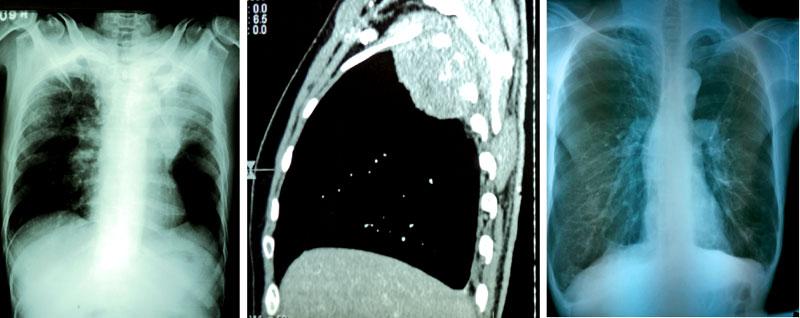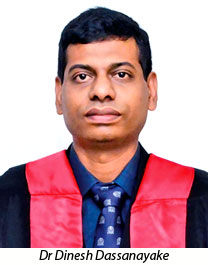
’Respire 9’ was the subject of discussion at the recently concluded academic sessions of the Sri Lanka College of Pulmonologists, early this month. The theme being, ‘Nurture your lungs for life’ and discussions focused primarily on adverse effects of air pollution on our bodies, the Sunday Observer asked Consultant Respiratory Physician, District General Hospital, Nuwara Eliya , Dr Dinesh Dassanayake to give us more insights into a subject not many still understand.
 Excerpts
Excerpts
Q. ’Respire 9’ with the theme ‘Nurture healthy lungs for life ‘was the focal subject of discussion at the recently concluded academic sessions of the Sri Lanka College of Pulmonologists. Among the issues discussed, what were some of the most important and most pertinent, globally?
A. Air pollution. It was timely, and very pertinent, both locally and internationally. Topics on tuberculosis, lung cancer and obstructive air ways disease of interest in the field of respiratory medicine, were among the other topics.
Q. What issues were particularly relevant to Sri Lanka?
A. Health effects due to air pollution, Chronic Obstructive airway disease and lung cancer are some of the issues relevant to us. Respiratory diseases are a major disease burden as the second leading cause of hospital admissions. It is also the second leading cause of hospital deaths in Sri Lanka.
Q. The highlight was the presentation of Dr C.G. Uragoda’s oration on, “The air we breathe : its impact on our health”, by the Director of Chest Research Foundation, Pune , India, Dr Sandeep Salvi. Why was this subject the focus of your discussion?
A. The air we breathe today, is much more polluted than it was a decade ago. Industrialization, changes in lifestyle, increased use of motor vehicles and newly emerging indoor pollutants have changed the face of air pollution, both locally and internationally. Nitrogen dioxide, Sulfur dioxide, Carbon dioxide, Carbon monoxide and ozone are gaseous pollutants. Small particles suspended in the air known as particulate matter [PM] are now known to cause much more health impact than what it was thought to be. The amount of some of these traditional pollutants have gone up due to industrialization, increased power generation using fossil fuels, and increased vehicle use. Face of indoor air pollution has also changed due to the burning of various items like mosquito coils and incense sticks inside homes. Smoke given off from burning firewood is contributing to the burden of indoor air pollution leading to a significant burden of respiratory diseases.
Q. How have these pollutants impacted our health?
A. Health impacts of air pollution are immense. They can range from transient illnesses like inhalation fevers to fatal diseases like lung cancer. Some of the toxins like carbon monoxide can cause death if inhaled in significant amounts. Toxins like sulfur dioxide can cause exacerbation of respiratory illnesses like asthma and hay fever. When exposed to air pollutants including tobacco smoke chronically, it can lead to lung damage resulting in Chronic Obstructive airway disease [COPD]. Toxins contained in vehicle exhaust, especially, diesel exhaust can cause lung cancer. Particulate matter is now known to cause diseases like diabetes, heart attacks and strokes.
Q. Any scientific evidence on this?
A. New evidence from studies in Europe show, increased amount of particulate matter in air will lead to increased number of heart attacks and strokes as well as an increased incidence of new onset of diabetes among females. Evidence from studies in Europe has revealed that if pregnant mothers are exposed to air pollution, their offspring can have problems in the development of their brains leading to psychomotor problems. When children are exposed, the growth of the lungs will be retarded, and lung function will also be impaired, a recent European study shows.
Q. Mosquito coils, incense and joss sticks are used in most Lankan homes. Can they cause indoor air pollution?
A. These are emerging as significant pollutants causing indoor air pollution. Burning of items such as mosquito coils and incense sticks gives off particulate matter as smoke. inhalation of such smoke will aggravate diseases like asthma and hay fever.
Q. What about cooking on firewood stoves inside ill ventilated homes?
A. Firewood smoke is a major indoor air pollutant in countries like Sri Lanka where a majority of households are using firewood for cooking. This is particularly relevant to areas like Nuwara Eliya and the estate sector, due to accumulation of smoke in poorly ventilated houses in these areas. Toxic gases like carbon monoxide [CO], carbon dioxide and particulate matter is released during cooking. The amount of CO can go up to 50 times the safe level and particulate matter can go up to 200 times the safe limit during cooking. Exposure to wood smoke is considered a major risk factor for developing Chronic Obstructive lung diseases, [COPD] especially, among females who do not smoke. Damage caused to lung by wood smoke is similar to that caused by tobacco smoke. Complications of COPD is much worse than that caused by asthma. COPD due to wood smoke is a well-recognized clinical entity among females in areas like Nuwara Eliya as they use wood not only for cooking but also for warming houses. Barbecue stoves can also be deadly if they are kept inside rooms as they give off carbon monoxide which can cause death if inhaled in adequate amounts, even without any symptoms. Several deaths have been reported in the recent past in Nuwara Eliya where tourists have kept used barbecue stoves inside the room for heating. Similarly, generators should not be kept inside rooms as these can also give off deadly carbon monoxide gas.
Q. Tobacco smoking has also been cited as a cause of air pollution. Your comments.
A. Tobacco smoke is a common pollutant that not only leads to COPD but also lung cancer. Both, active and passive smoking can lead to respiratory diseases and millions of people worldwide are exposed to tobacco smoke causing nearly 5 million deaths a year. Effects of tobacco smoke is not confined to the lungs. It is a major risk factor for heart attacks, peripheral vascular disease and strokes, and it can also cause cancer of the bladder.
Q. Apart from man made pollutants there are natural pollutants such as, pollen released into the air which has been cited as a cause for asthma in cold countries, especially, during summer. Is Sri Lanka vulnerable to such natural pollutants?
A. Not only pollen but organic dust released, especially, during harvesting season, e.g. paddy, can lead to exacerbation of existing respiratory disorders like asthma.
Exposure to such organic dusts can also lead to a disease called hypersensitivity pneumonitis which needs special respiratory investigations to diagnose, and needs specific treatment. This disease is prevalent among the farming community in Sri Lanka, especially, paddy farmers.
Q. Since we are talking about Healthy Lungs, how exactly does air pollution affect our lungs?
A. Being the largest epithelial surface directly exposed to air/environment it is the most vulnerable organ for effects of air pollution. Lungs filter out 10,000 litres of air per day and are constantly exposed to air pollution. Toxic gases can directly damage lungs causing lung diseases. Air pollution can retard lung growth in children. Particulate matter with size of < 10 micro metres can reach distal airways which not only can damage the lung, but the body’s reaction to these particles can lead to diseases elsewhere. Some of the pollutants act as carcinogens that lead to lung cancer.
Q. When the lungs are compromised what happens to the rest of our body?
A. Damaged lungs will not be able to provide adequate oxygen to the rest of the body and remove carbon dioxide. This can lead to various effects on the other organs. Furthermore, a diseased lung will cause changes in the blood vessels which in turn can lead to poor function of the heart.
As I mentioned earlier, the body’s reactions to particulate matter inhaled will cause blood clots to form in various organs that lead to heart attacks and strokes.
Q. What are the early symptoms of adverse health impacts of air pollution on our bodies, especially, lungs?
A. Cough is one of the earliest symptoms and breathlessness is also an important symptom. Wheezing, increased sputum production and chest tightness are other features.
Q. Are they treatable? Are the effects reversible? Or if neglected can they have long lasting effects?
A. Most of the health effects are treatable, especially, if detected early, however ongoing exposure to air pollution can have long standing effects. Investigations like spirometry is necessary to confirm some of the diseases like COPD and should be performed early, for early diagnosis will help prevent complications and better control of the disease. Most of the diagnostic tests are now available in all hospitals where a Consultant Respiratory Physician is available, including in most of the District General Hospitals.
As cough is the commonest respiratory symptom which can be a manifestation of simple illness like bronchitis and also a feature of deadly lung cancer, cough should not be neglected.
Patients with chronic cough and respiratory symptoms should see a respiratory physician who can arrange all the necessary investigations to diagnose these diseases early.
Q. What has the Sri Lanka College of Pulmonologists done to minimize risks to human health from air pollution?
A. The Sri Lanka College of Pulmonologists has taken several steps to highlight the importance of addressing air pollution. It was a hot topic in most of the recent Annual Academic Sessions, as well as, regional meetings which has helped to disseminate knowledge on the health impact of air pollution, among medical professionals. Members of our society are also involved in public awareness programs, especially, for schoolchildren.
Sri Lanka College of Pulmonologists was able to equip most of the respiratory units in the country with modern diagnostic tests through the Ministry of Health last year, and most of these units in the Peripheral District General Hospitals, Provincial General Hospitals and Teaching Hospitals are capable of diagnosing and treating such patients with respiratory diseases in the periphery itself.
Q. Your advice to the public on preventing air pollution?
A. Prevention of outdoor air pollution needs inputs from all stakeholders involved in protecting the environment and should aim at removing or controlling sources of air pollution. Open burning and smoking should be avoided by individuals.
People constantly exposed to dusty and polluted environments and work in such places should wear masks. People should be advised not to burn any items inside homes that gives off smoke like mosquito coils and incense sticks.
Kitchens which use firewood should have good ventilation and have a chimney and windows for smoke to escape and it’s a good practice to keep the windows and doors open during cooking to avoid any smoke accumulation inside the kitchen.
Most of all, people who have chronic respiratory symptoms should see a respiratory physician to diagnose these respiratory disorders before the lung is irreversibly damaged.
